-
RESPETO (Treb Monteras 2017)
TREB MONTERAS (ALBERTO MONTERAS II): RESPETO (2017)
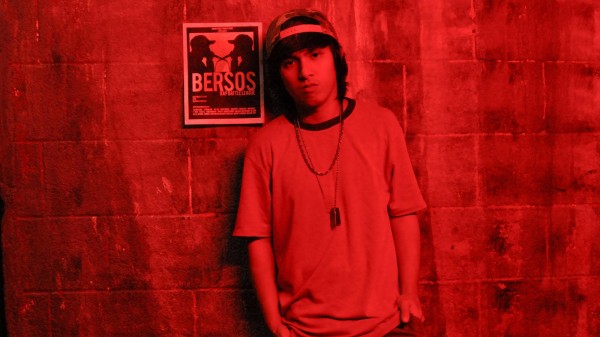
ABRA IN RESPETO
The Philippines seeks a voice and finds a cycle of violence
Respeto begins as a hiphop coming-of-age movie, a sort of Filipino Eight Mile whose protagonist, Hendrix (Abra), comes from the very poor down-and-dirty world of the Pandacan slums, the underside of Manila, in which underground rap is the new anthem-maker. But first time filmmaker Alberto Monteras II has things to say about every aspect of the Philippines. Rap is only one voice of a story about politics and society. The oppressive Duterte regime is awakening in older Filipinos horrifying memories of the days of Marcos' dictatorship they thought they had gotten rid of. Monteras and his cowriter Njel De Mesa weave this movie into a powerful myth of ongoing conflict and cruelty.
Petty crime brings Hendrix close to Doc (Dido De La Paz), one of those older Filipinos, a bookseller and protest poet during Marcos, whom Hendrix first tries to rob and then adopts as a mentor. It turns out Doc was a practitioner of balagtasan, a Filipino art of debate conducted in verse, so he was a kind of ancestor rapper.
Hendrix lives with his sister Connie (Thea Yrastorza) and her boyfriend Mando (Brian Arda), and robs the latter to have money to enter the big local "Versus" rap contest, the movie's first big noisy vérité scene, since like Eight Mile, real rappers are used. He goes first, so we know he's going to lose. He fails miserably, trying to better a large female rapper opponent Luxuria with crude fat jokes. She easily destroys him and he is so daunted he pisses himself, which makes him notorious.
Then with his sidekicks Betchai (Chai Fonacier) and Payaso (Yves Bagadion) he conceives the idea of robbing Doc to repay his sister's boyfriend. Thus another world enters his life. The movie is in no hurry. Gradually it emerges that 'Drix's sister and boyfriend are selling drugs and use him as their runner. Getting to know Doc through repairing damage they cause breaking in, Hendrix steals a notebook of poetry and uses lines for his raps. But Doc, who may have early stage dementia, and turns out to have suffered traumatically under Marcos, is watching Hendrix and sees worth in him.
As we learn more about Doc he reveals that his family was abused by Marcos' government thugs and though he smashed one of them in the head with a rock, it felt ineffectual. A parallel was struck early on when at a club Hendrix sees his love Candy (Kate Alejandrino) raped by his perfidious rival Breezy G (Loonie) and can do nothing to stop it. And this mirrors the nation forced to watch impotent as two brutal regimes wreck havoc. In this context while rap contests like Versus are clearly a place where the urban poor can raise a loud voice, they're not seen as saving anything but instead, like the current regime, only play with more conflict, the drug lords bringing awful violence, and the vicious cycle going on.
Sometimes Respeto seems mired in the vulgarity and crude humor of a third world B-picture. On the other hand local reviewers fall into the airy generalizations of a term paper. It's hard to explain how Monteras welds mud into a meaningful shape, and his movie is so deeply vernacular no outsider can appreciate the message of its constant wordplay. But imperfect as it is, Respeto has more meaning and emotion in it than other more polished entries in the festival, and means a great deal to many Filipino viewers.
From Susan Claire Agbayani in Rappeler we learn that "National Artist for Literature Bienvenido Lumbera, and poets Vim Nadera (who had a cameo in the Balagtasan scene in the movie), Frank Rivera and Mark Angeles contributed poems to the film," as well as that actual Filipino rappers Mike Swift, Apekz, Abbaddon, J Skeelz, Mike Kosa and M-Zhayt and female rap artist Luxuria" perform in the Versus scenes speaking their own lines.
This feisty little movie won several awards including Best Picture at the Cinemalaya Philippine Independent Film Festival and received a ten-minute standing ovation Aug. 2017, and was released theatrically in the Philippines in Sept. 2017. It surprised and pleased the filmmakers by also winning awards at Cyprus, and it gained more international attention with a Rotterdam screening. It was screened for this review as part of NYAFF, where it shows at 7:30 p.m. on 14 July 2018.
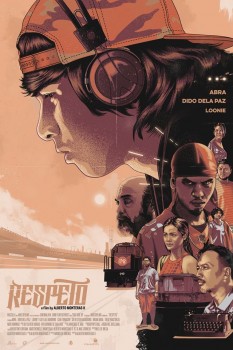
Poster by V.Aseo and M.Lazarte (from Esquire)
Last edited by Chris Knipp; 06-29-2018 at 05:01 PM.
-
River’s Edge Isao Yukisada (2018)
ISAO YUKISADA: RIVER'S EDGE (2018)F
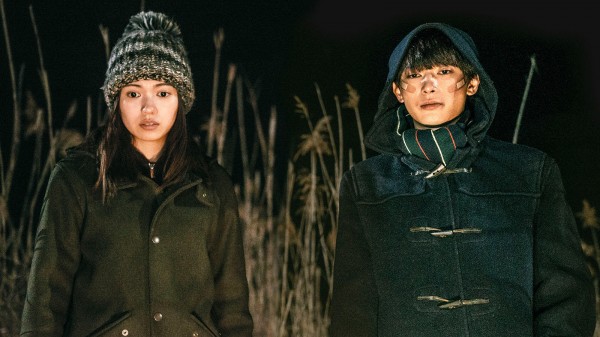
FUMI NIKAIDO AND RYÔ YOSHIKAWA IN RIVER'S EDGE
Angsty and chic Japanese high school drama set in 1994
Ichiru Yamada (Ryô Yoshizawa) is the formerly bullied, closeted gay friend of Haruna, the main character (Fumi Nikaido), whose dreams of UFOs doubtless owe something to Gregg Araki's Mysterious Skin , but everything in Isao Yukisada's River's Edge is adapted from a popular manga strip by Kyoko Okazaki. This must explain its appeal to an adolescent audience and also the shallowness of the characters. The title, "Ribâzu ejji" in the original, a transliteration of the English, references the more tightly plotted 1986 American movie that helped bring Crispin Glover and Keanu Reeves to public notice. Perhaps this is nostalgic for Japanese forty-somethings? The veteran director Isao Yukisada is now 49.
Ichiiru is still bullied, because Haruna rescues him locked naked in a locker. His victimizer is her own boyfriend, the tall, longhaired wild boy Kannonzaki (Shuhei Uesugi). There is also Kozue Yoshikawa (Sumiru), a bulimic classmate who is in TV ads. Ichiru dates the naive Kanna (Aoi Morikawa), who's unaware that he's gay, just thinks he's "fashionable and mysterious" (using the English word 'mysterious'). Only Haruna knows. Kannonzaki is having sex and snorting coke with the class slut, Rumi (Shiori Doi) - leading to a couple of surprisingly graphic sex scenes. The sequence where Ichiru takes Haruna out into the high grass to show her the decayed corpse he has discovered a year or so ago, having shared this secret earlier with Yoshikawa (they call each other by last names), may evoke Gregg Araki. Araki's Apocalypse Trilogy is more vivid, more fun, but less cool and chic than River's Edge. This film has a ghoulish side, but is also funny; it makes sense to call it a "tragicomedy."
These are Tokyo sophisticates, yet the atmosphere, the "river's edge" being rough and industrial, is also rather seedy. Rather than developing a coherent plot (though there is plenty of action 3/4 of the way through), the manga narrative seems more designed to show what urban Japanese high schoolers were up to in the Nineties, which could be a revelation for the younger and more naive, and titillation for the older who may have missed out on some of this, or anyway are past it now. But no one would want to be up to all these things, which are both idiotic and terrible. We are witness to crimes. It's manga.
River's Edge / リバーズ・エッジ ("Ribâzu ejji"), 118 mins., debuted in the Panorama section of the Berlinale 15 Feb. 2018 and opened in Japan the next day. It also had festival showings at Hong Kong, South Korea's Jeonju International Festival and Nippon Collection in Germany. It was screened for this review as part of the 2018 New York Asian Film Festival, where it shows 3 Jul. 2018 at 6:30 pm. Jonathan Romney wrote a Screen Daily review from Berlin.
Last edited by Chris Knipp; 07-16-2018 at 11:25 PM.
-
LOOKING FOR LUCKY (Jiang Jiachen 2017)
JIANG JIACHEN: LOOKING FOR LUCKY
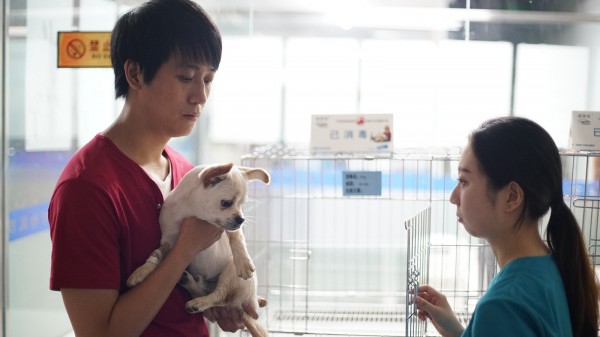
DING XINHE (LEFT) IN LOOKING FOR LUCKY
Getting ahead and falling behind
Looking for Lucky is a Chinese comedy-satire about contentiousness and insecurity. The latter exists for nearly all of us, particularly millennials, in a world where there are hardly any truly secure jobs anymore. In fact this film is so realistic, if ramped-up, and anxious, it's hard to see it as a comedy at times. Nonetheless if may have wide appeal, and Jiang Jiachen stands out in his first feature for his original methods and style.
Though the film speaks to today's universal insecurity, it uses very specific regional details of Chinese and more precisely northeastern Chinese culture and language. The director says that in Shenyang, the big city in northeastern China that's his hometown and the setting, "people argue continuously." The continuous quarreling involves everybody. As elsewhere in China, bribes are carefully calibrated, even refereed by the police. If you cause any harm that may be actionable, an immediate payoff is expected, and advisable.
This issue comes up immediately, and maybe nothing quite matches the opening sequence for comedy, or absurd heightening of Shenyang argumentativeness. Zhang Guangsheng (Ding Xinhe), about to finish his master's degree after three years, has been taking care of his Professor, "Old Niu's," white bulldog, Lucky (certainly an ironic name for him). As somebody pointedly declares later, Guangsheng is Old Niu's dog himself. He's momentarily put the care of the dog in the hands of his father (Yu Hai), a laid-off factory worker. A fat woman with a squalling little boy is accusing Guangsheng's father of allowing the dog to bite the kid's finger. The father begs to differ. A little crowd has gathered. Everyone is shouting at the top of their lungs. The dog, however, has disappeared. Guangsheng's father didn't have it on a leash and has let it get out of his sight.
When Guangsheng arrives, he is immediately in a panic. He vociferously blames his father for his negligence. Guangsheng and his father are continually arguing through most of the movie. But this is a father-son buddy picture. Before the end, the dad's true caring emerges from beneath the contentiousness. Guangsheng's panic leads him into other traps and payoffs besides the fat lady. His (also fat, and comedic-intense) printshop owning buddy insists he must offer a reward for a finder of the dog, and when the notice goes up, some scammers offer a whitish bulldog, then force him to take it by threatening to eat it if he doesn't.
For contrast, view, if you can, French comic maaster Étienne Chatiliez's 2001 comedy Tanguy. That too is about a graduate student whose future is uncertain, and is full of feelings of anxiety, sometimes on the part of the student, Tanguy, more often on that his beleaguered dear maman and papà. His speciality, incidentally, is Chinese. Chatilliez's highly-crafted film maintains a light atmosphere even when the parents are being driven nutty by their pretentious, though exemplary, son who just never seems to be going to move out and leave them in peace. But the posh bourgeois setting of Tanguy and its elaborately constructed, and more leisurely, scenes allow the viewer more breathing room to enjoy the fun at an enjoyable remove, even though stay-at-home adult children are becoming more familiar in the first world.
In his director's statement for Hong Kong the thirty-four-year-old director lays claim to "a sense of absurdness" in his premise of "a young guy" who is "looking for a dog and a job upon graduation." There is confidence and intensity in Jiang's Cassavetes-style improvisation and a structure that disappears in the action. But it is the 61 long takes of unrelieved nervous action whose exhausting intensity makes it harder to see this movie as laughable or a satire because the comedy is so high strung.
The dog serves as a symbol of subservience, the subservience of Guangsheng to his professor, the subservience of everyone, especially millennials, to the system. Guangsheng's vague love interest - though he's too busy being servile to his professor to pursue it, if that were even allowable - is a young female student in his year who turns out to have her own way of getting ahead. As the film brings in fellow students Jiang's strong sense of the milieu and particularly of economic factors comes through even more. Though Guangsheng departs for some job as a finale and Old Niu has been suitably dealt with, Looking for Lucky isn't about resolution. It's about the problem, and the absurdities and extremes it leads people into.
Looking for Lucky debuted at Hong Kong (see listing), also showing at Shanghai, receiving the Asian New Talent Award and two nominations there. It was screened for this review as part of the NYAFF, showing 8 July at 2:30 PM.
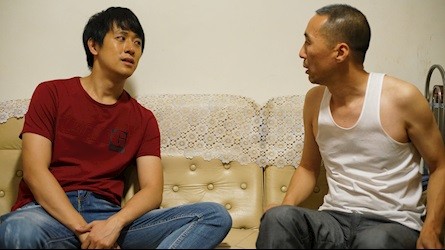
DING XINHE AND YU HAI IN LOOKING FOR LUCKY
Last edited by Chris Knipp; 07-03-2018 at 12:09 AM.
-
OLD BEAST/LAO SHOU (Jhou Ziyang 2017)
JHOU ZIYANG: OLD BEAST/LAO SHOU (2017)
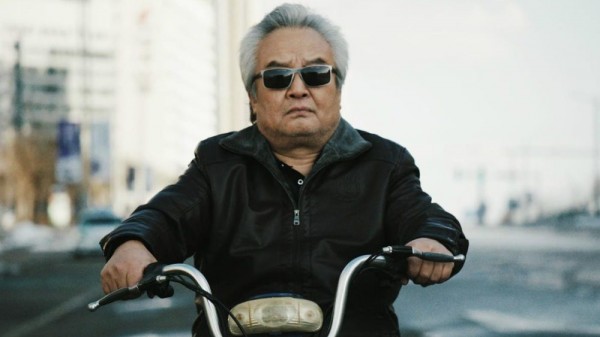
TU MEN IN OLD BEAST
Family relations
Lao Yang (Tu Men), the center of this tale, is a despicable sixty-something pater familias who at first just seems a wretch. His wife is dying in the hospital and he is lavishing expensive gifts on his mistress and grandson and blowing cash at cheesy massage parlors and Mahjong dives. And it gets worse. His married siblings wrangle over the cost of an operation for his wife, their mother, and when they reluctantly agree and put money together, he steals it and blows it. Then an old shepherd buddy leaves him his camel, which is awaiting the vet, and he sells the camel and pawns his little motorbike to buy a cow, which he fobs off on his naive friend as more profitable than the camel. The family are so angry they lock him in a cellar. But cell phones are wonderful, and he gets the police to let him out, and sues his family. That, later, he regrets, when he wins.
But in this beautifully photographed film (by Belgian China resident Matthias Delvaux) with its compelling lead performance there is more than just the picture of an aging rogue digging himself into a deep dark hole. This is a grim watch but also a complex and original one - even if its picture of modern China, with its failed new city and squabbling, mercenary and selfish youngsters, is not so unusual.
The setting plays a constant role. It is the city of Ordos. And therein lie Lao Yang's extenuating circumstances. In Inner Mongolia, it's perhaps the government's most spectacular failure among its new towns to resettle populations in (hopefully) growing industrial areas. It's a vast cluster of old slums and abandoned new highrise developments laced with grandiose statuary. As Lao Yang tools around on his little motorbike, with his small, plump body and big head topped with a grand mound of pearly gray hair, his bravely youthful leather jacket and pseudo-stylish sunglasses, the Neverland of failed urban development hovers with mocking indifference behind him.
Here, real estate collapsed, and Lao Yang was in real estate. But before that decline of his fortunes, he was successful, and from his manner, probably powerful (the actor, Tu Men, once notably played Genghis Khan). He worked hard to get his children educations and set them up with careers and spouses. Now, they don't need him. In this context, his dissolute behavior is an act of protest in the face of ingratitude. The spouses of the children are chillier than the children themselves. These general facts either you know or you figure out, in watching. They are embedded in the action, emerging in remarks Lao Yang makes. "You don't like Lao Yang?" this movie says: "Well, just look at the rest of his family." There's no one to like.
At first, with his late night gambling and his outer polish and mask of white hair Lao Yang made me think of Roger Duchesne in Jean-Pierre Melville's Bob le Flambeur. But Bob is a benevolent, failed crook, whose gambling hurts nobody. His elegance doesn't get tarnished. He is nice to his concierge. Still Lao Yang is an unusual choice of protagonist and he makes you cast around. Later as events stayed gloomy and got darker and Lao Yang got blood on his nose and mud on his shoes, my thoughts turned to the films of Robert Bresson. But that won't work either because here the struggling is menial and never ennobling as in Bresson.
There are indications in this feature debut that Jhou Ziyang is a quite original voice. He has found a unique point of view in this unlikable protagonist, and a specific place in this big hulk of a city.
What is Lao Yang doing at the end when he returns home to care for his dying wife? Has he reformed? Has he repented? Or has he merely found the only comfortable birth for himself and a new maliciousness behind a new mask? At times he has only his cigarettes and his flip phone, and his cigarettes are rumpled and his flip phone is losing power. Lao Yang is one of the loneliest men in Chinese cinema. And that's something to see.
Old Beast / 老獸 Lǎo shòu ("Old Beast"), 108 mins., first appeared in July 2017 at Xining, then was noticed at Tokyo in Oct., and Taipei in Nov. and it was reviewed by Richard Kuipers in Variety and Clarence Tsui in Hollywood Reporter. It won three prizes and four nominations, getting the FIPRESCI Prize, Best Actor, and Best Screenplay (and Zhou penned his own screenplay) at Taiwan's Golden Horse awards. It received theatrical releases in China (Dec. 2017) and Taiwan (Jan. 2018), with other festival showings (Miami, Singapore); it was screened for this review as part of the New York Asian Film Festival at Lincoln Center, where it shows Tues., 3 Jul. 2018 at 9 p.m.
Last edited by Chris Knipp; 07-01-2018 at 09:53 AM.
-
WRATH OF SILENCE//BAO LIE WU SHEN (Xin Yukun 2018)
XIN YUKUN: WRATH OF SILENCE/BAO LIE WU SHEN (2018)
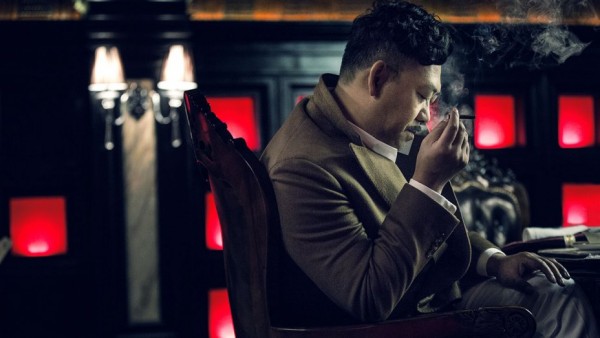
JIANG WU IN WRATH OF SILENCE WITH "A SQUIFFY HAIRDO" (ELLEY) - A MARCEL WAVE, A RURAL LUXE LIKE FOREIGN CIGS?
Mute revenge in the wilds
Derek Elley of Sino-Cinema as usual provides informed and linguistically savvy comments on this film, summarizing its elaborate plot, then evaluating the execution, comparing it favorably with careful assessment of the 33-year-old Chinese filmmaker's previous efforts. Clarence Tsui makes further claims for this new film in his Hollywood Reporter review.
The lead character is a mute miner, Zhang Baomin (Song Yang), who returns to the dusty Inner Mongolian hills to find his 12-year-old sheep-herding son missing and foul play, not for the first time, going on among the mining companies on the part of the local tycoon, Chang Wannian (wuxia movie vet Jiang Wu). Chang is "villainous," with all that implies of the slightly over-the-top. In between is Xu Wenjie (Yuan Wenkang), a cleancut looking but morally tainted lawyer under investigation for activities with Chang.
Reviewers consider this to be a film that plays impressively with elements of Western and noir genre. Elley comments that Xin's 2014 debut had "unnecessarily arty" elements, but this movie "falls somewhere between commercial and arthouse cinema in consistently interesting ways."
Whether the balance feels right depends on the viewer's commitment to the action, which for me wavered at first. It seemed the opening scene's exploitation of the photogenic quality of sheep; a suddenly missing small boy; a vengeful, angry mute man; and a sleazy local boss stuffing his face with greasy chunks of meat were laying on the cinematic gestures rather thick for just the first fifteen minutes. But isn't one of my favorite modern movies, Jim Jarmusch's Dead Man, pretty much an oddball, arty Western through and through? There's no doubt that Xin Yukun wields his version of a cowboy revenge movie with skills equal to ambition,helped by a Korean martial arts director for fight sequences and a cadre of accomplished and known professional actors in key roles.
It's nothing like Dead Man, of course. It does not subvert genre in such an original way and is more just an actioner. Despite occasional artful juxtapositions by the editor, Hu Shuzhen, the arty feel fades by midway when the film settles into a lot of chasing around, with two missing children and Baomin taking on crowds of bad guys singlehanded. It's modern western, basically, with an Asian martial arts vibe, in which people just have flip phone rather than smart phones. Actress Tan Zhuo, by the way, stays at home, underused, as Baomin's wife, Xia Cui.
Wrath of Silence / 暴裂无声 (Bao lie wu shen, "breakless silence") 119 mins., debuted Jul. 2017 at First International Film Festival Xining, then showing at London, Taipei, Singapore, Macao. It was screened for this review as part of the 2018 New York Asian Film Festival, showing 9 July 2018 at 6:30 p.m. New York Premiere · Q&A with director Xin Yukun and actor Jiang Wu, who will receive the Star Asia Award.
Last edited by Chris Knipp; 07-17-2018 at 12:15 AM.
-
PARADOX (Wilson Yip 2017)
WILSON YIP: PARADOX (2017)
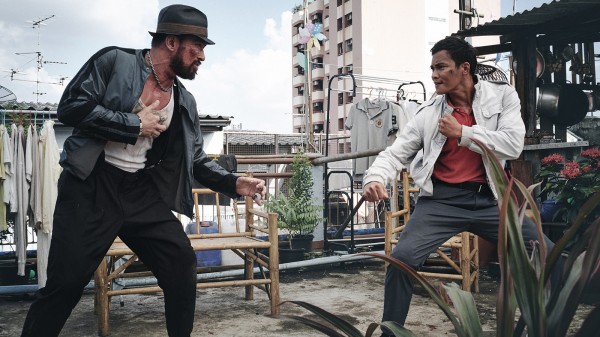
CHRIS COLLINS AND LOUIS KOO IN PARADOX
A trip to Thailand
Paradox is as adept as many other Hong Kong action movies, including the two previous of the 'SPL' franchise to which it is linked. This one takes us from Hong Kong to a new location and a kidnapping for very nefarious purposes. The themes of pregnant daughters and organ theft are interwoven in a pretty disturbing way. But they're there not so much for any depth of exploration as to function as engines for action requiring a variety of bad guys and some frenetic running around.
At the center is Hong Kong cop Lee Chung-Chi (the handsome and buff and newly martial-arts-ready Louis Koo). His teenaged daughter Wing-Chi (Hanna Chan) brings the unwelcome news that she's pregnant by some uneducated stranger she wants to marry now. Rather than blessing this union, Lee gets the boy arrested, and this leads Wing-Chi to flee to Thailand, where's she's kidnapped by organ thieves to provide a heart transplant for the aging and ailing mayor of Bangkok seeking reelection. Given that his brutality has set off the fate of his daughter, the heroic Lee isn't so heroic after all, an aspect that might have made for richer treatment than it gets here.
The mayor and his breathtakingly unscrupulous manager Cheng Hon-Sau (Gordon Lam) provide one subplot. The organ theft kingpin, a burly and crude American called Sacha (Chris Collins) whose cover is a meatpacking plant, is the other. Lee links up with local cops Chui Kit (Wu Yue) - whose wife is pregnant (another, parallel, subplot) and ranking officer Chai (Vithaya Pansringarm) - a little too close to local government bosses to be honest. They are joined, all too briefly, by the acrobatic Thai martial arts star Tony Jaa, as a another local cop. As Lee pursues his search sometimes with fellow cops, sometimes on his own, he's occasionally also helped by a good-hearted hooker (Jacky Cai).
If a righteous, vengeful cop wiping out a horde of bad guys in a warehouse is your thing Paradox will be all you need. The action sequences are relentless and hyper-active. The scenery is pretty. The bad guys are really bad. But there isn't enough complexity to the plot to make this stand out from so many Hong Kong action movies with cops and bad guys. The local industry is shown by this festival selection to be producing this genre as well as ever, but it becomes ever harder to bring out a truly original one.
If Paradox stands out from its peers, it could be for the preponderance of brutal hand-to-hand combat, which includes a wealth of knife-cuts and spurting blood, all executed with precision and clarity. A man listening to a beating heart may be the most memorable image, however. Sammo Hung was in charge of the fight choreography. The work of dp Kenny Tse is impeccable. The writing of Nick Cheuk and Lai-Yin Leung could have been more plausible. For a convincing tale of organ theft, go to Stephen Frears' 2002 Dirty Pretty Things , or for a truly great film about a dicey heart transplant, watch Claire Denis' 2004 L'intrus/The Intruder.
Paradox / 殺破狼・貪狼 (Sha po lang: taam long, "The Killing Wolf"), 98 mins., opened in China, Singapore, Hong Kong, Taiwan and Thailand in Aug.-Oct. 2017, showing at San Diego and Taipei Nov., releasing i South Korea and Japan in 2018. Screened for this review as part of NYAFF, showing 4 Jul, 2018 at 7:45 p.m.
Reviewed in Hollywood Reporter and Screen Anarchy .
Last edited by Chris Knipp; 07-03-2018 at 12:25 AM.
-
HIT THE NIGHT (Jeong Ga-young 2017)
JEONG GA-YOUNG: HIT THE NIGHT (2017)
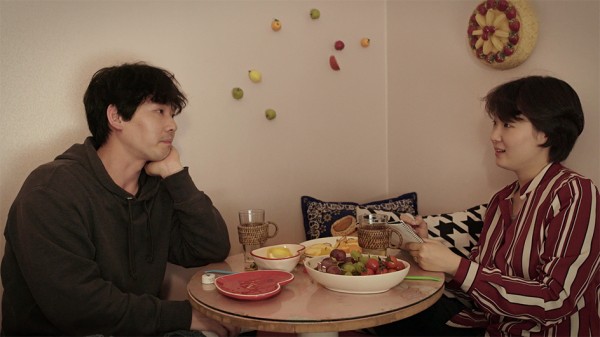
PARK JONG-HWAN AND JEONG GA-YOUNG IN HIG THE NIGHT
Boy hunting in the rough
Jeong Ga-young is most known in Korea as an actress, but as she turns to directing as well, she invites the description of "female Hong Sang-soo" with this film consisting, like Hong's, of long scenes of talking and drinking. This variation lacks the polish or the charm of Hong, but in its relative crudeness and its flipping of the gender roles, it may have more bite.
An aspiring female director, also called Ga-young and played by Jeong, seeks to seduce male acquaintance Jin-nyeok (Park Jong-hwan) through a lengthy, provocative interview, ostensibly conducted as parparation for a film (she takes notes). Ga-young delves into Jin-nyeok's love-life over a night of drinking. Jeong is small, with short hair. Jin-nyeok is tall, with bushy, boyish hair (Park has worked as a fashion model). Jeong started as a director with the 2016 Bitch on the Beach, which references Hong Sang-soo directly. This Ga-young is neither subtle nor romantic, starting right out with questions about how many times Jin-nyeok masturbates, whether he thinks of his girlfriend as he does so, and so on. Jin-nyeok is a sufficiently complex (and understated) personality to make the outcome uncertain.
Jin-nyeok may be the boy of Ga-young's dreams, and at least she hints that she's interested, but he repeatedly says that he isn't. Given her laughably inappropriate approach, that's no surprise. We also understand that she is paying him for this "interview," though its purpose as preparation for a film seems dubious. On the other hand, Jin-nyeok doesn't walk away.
The evening starts with dinner, then moves on to drinks, and ends with karaoke. The drinking they do at a kind of club with booths. When Jin-nyeok goes to the bathroom, he has a hard time remembering which booth they were in. At the Karaoke club, a plump, bespectacled friend of Jin-nyeok's appears. She goes walking with this new guy,who unlike Jin-nyeok, is quite willing to kiss her. They seem to hit it off. But she won't allow him to accompany her home. She calls back Jin-nyeok, saying the interview wasn't over, and there is more conversation, unsatisfying for her.
There is discussion of a film Ga-young made or wanted to make, a sort of knockoff of Park Chan-wook'sOldboy, and uncertainty about the ending. And so Jeong prepares us for the non-ending of this film, with Ga-young alone, back at her apartment, sitting at a desk.
As one who has watched with pleasure a dozen or so of Hong Sang-soo's prolific output, it was natural to be curious about a female version, but I was somewhat disappointed, since this movie not only lacks the fluency and sparkle of Hong, but also Jeong, as an actress, is blatantly no match for the beauty and vivacity of Hong's current muse, Kim Min-hee. On the other hand, one can see how Park Jong-hwan could have won an acting prize. He disappears into his role seamlessly, making every reaction and answer feel spontaneous. And there is finally something solid here. In the relative crudity of Jeong's film compared to Hong's, the awkwardness of the situation, with the confident but abashed man and the timid predatory woman, is allowed to feel complex without any external effort, and the role reversal, coming in Korea in the "Me Too" era, has resonance.
But all is not aces here. The minimal situation and talky two-hander wears out its welcome half way through if not before. The tech aspects are only so-so, with some imbalances in the sound.
Hit the Night / 밤치기 (Bam-chi-gi, "Chestnuts"), 85 mins., debuted at Busan, where it won the Actor of the Year Award (for Park Jong-hwan) and the Vision-Director's Award. It also showed at Rotterdam in Jan. 2018 and in competition in the Seoul International Woman's Feature Festival Jun. 2018. Screened for this review as part of the New York Asian Film Festival, showing July 6, 2018 at 6 p.m.
Last edited by Chris Knipp; 07-03-2018 at 12:39 AM.
 Posting Permissions
Posting Permissions
- You may not post new threads
- You may not post replies
- You may not post attachments
- You may not edit your posts
-
Forum Rules






 Reply With Quote
Reply With Quote







Bookmarks